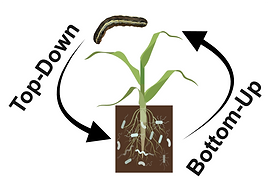Research
We examine local and systemic plant defense against insect herbivory and effects on surrounding ecological communities. Ultimately, our findings identify sustainable solutions for protecting plants from herbivory in natural and agricultural ecosystems. We strive to answer the following questions:
1. What are the chemical mechanisms and ecological consequences of plant defense against aboveground or belowground insect herbivory?

Research on plant defense has historically focused on aboveground leaf-feeding insects, but there is mounting interest in root responses to belowground herbivory. However, whether plants deploy similar defenses against aboveground herbivores compared to belowground root-feeders remains unclear. We evaluate plant defense against insect herbivory within and across aboveground/belowground plant systems and effects on surrounding ecological communities.
2. How do plant-associated microbes modulate plant-insect interactions?

There is growing recognition that microbes systemically enhance plant growth, nutrients, and defense, altering interactions with insect herbivores. When microbes strengthen systemic plant defense against herbivory, this is considered a ‘bottom-up’ effect. In contrast, insect feeding damage can also induce ‘top-down’ effects and alter plant-associated microbes. We elucidate the role of plant-associated microbial communities in plant-insect interactions, focusing on ‘bottom-up’ and ‘top-down’ effects.